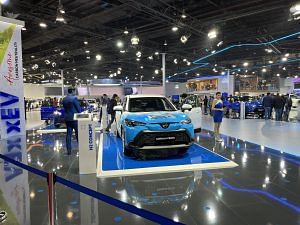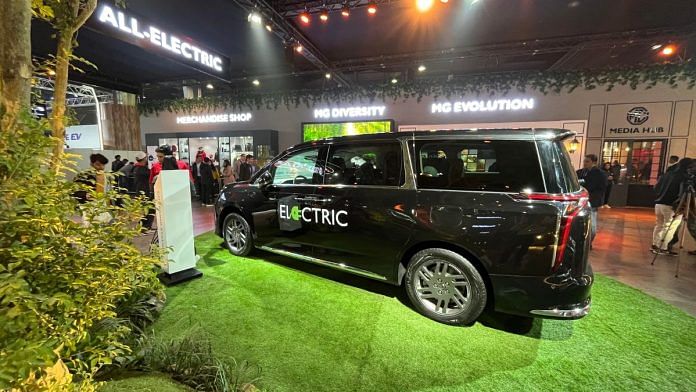Before the commencement of Maruti-Suzuki’s traditional Auto Expo opening conference in Greater Noida, a small ‘goodie bag’ waited on every seat. Inside was a small succulent plant, some potting mix and seeds. All very green, no doubt, but quite disappointing for those hoping for more ‘techy’ welcome gifts. However, for this author, it was a sign of things to come at the conference where Toshihiro Suzuki, president of Suzuki Motor Company, unveiled the EVX concept vehicle that will form the basis of Maruti-Suzuki’s first battery-electric vehicle—to be built in India come 2025.
For those interested in details about the EVX—which will use ‘Made In India’ batteries, a first for any electric vehicle using Lithium cells in India—it will be 4,300 mm long, the same as the Grand Vitara, albeit on a brand-new platform. The battery pack will be 60 kilowatt-hours (kWh), which should be suitable for a range of 500-plus kilometres. Many have wondered why the country’s largest carmaker has taken so long to produce an electric car, but with the EVX, Maruti-Suzuki has announced its intentions.
Sustainability is the central theme
As I indicated in a previous dashboard column, 2023 will be when the Indian automotive industry turns seriously toward electric vehicles. The first such event to take place in three years, this auto expo is all about electrics and sustainability and witnessing participation from leading automobile manufacturers. Chinese carmaker SAIC Motor, which sells cars under the MG brand, has a forest theme running across its pavilion. Most new products it has showcased are either full-battery EVs or hybrids.
Similarly, another Chinese carmaker, BYD, has showcased some of its new electric vehicles, while Korean company Kia Motors has unveiled its brand new EV9. Tata Motors has displayed the upcoming electric version of their Harrier SUV and brought out their Avinya concept, highlighting the futuristic design language of their EVs. Japanese automobile company Toyota has brought its first battery EV, the BZ4X, while its luxury brand, Lexus, has showcased many electric cars, including the concept LF-Z.

However, Hyundai is the only carmaker to actually introduce a new electric car to the Indian market—the Ioniq 5—pricing it at Rs 44.95 lakh for the first 500 customers. According to Unsoo Kim, managing director of Hyundai Motor India, the carmaker expects the order book for this award-winning vehicle to fill within the next few days.
On the upper floors of the India Expo Mart—where the show is being hosted—several start-up EV manufacturers in the two-wheeler sector, and commercial three and four-wheel vehicles, are trying to attract the attention of the media and customers. However, traditionalt wo-wheeler manufacturers such as Hero Motocorp, Bajaj Auto and TVS have decided to give the show a miss.
Also read: On Indian roads, it will be a Happy EV Year 2023 — Tata to Mahindra to China’s BYD
Not just EVs, expo also talking green fuels
It is fascinating to note the pivot the Indian automobile sector has taken ever since Union minister Nitin Gadkari threatened to ‘bulldoze’ the industry if it didn’t go for alternative fuels. While the industry reacted furiously to it back then, the writing was on the wall.

However, that writing was not only about ‘battery-electric’ vehicles being the future of automobiles. “There are many paths towards lower emissions,” says C.V Raman, executive director-technology at Maruti-Suzuki. The country’s largest carmaker recently introduced the Grand Vitara SUV as a strong hybrid vehicle and is considering launching more hybrids in the coming years, thanks to its partnership with Toyota. Raman also highlighted Maruti-Suzuki’s work toward making all its vehicles compliant with ‘E20’ fuel, a blend of 80 per cent petrol and 20 per cent sugarcane and foodgrain-derived ethanol.
The plan to blend ethanol in petrol has been a cornerstone of the Narendra Modi government’s agricultural policies and the urge to reduce dependency on imported crude oil. Raman pointed out that Maruti-Suzuki is also showcasing its first ‘Flexible Fuel Vehicle’, or FFV. Flex fuel is a blend of petrol and ethanol—85 per cent ethanol and 15 per cent petrol in the case of an E85 combination. A full-scale implementation of high-percentage ethanol blends in automobiles might take some time since the engines require extensive modification, but the Brazilian example has inspired the government to consider it seriously.
Then there is Hydrogen. Toyota and Hyundai have displayed their hydrogen-powered vehicles, the Mirai and Nexo, at the auto expo. Clearly, Modi’s Rs 20,000 crore push for ‘Green Hydrogen’ has given carmakers a significant incentive to produce such vehicles. However, a Toyota executive joked that only one pump can dispense vehicular Hydrogen in India, located in Faridabad and currently under repair. Maruti’s Raman said that the bigger bet with Hydrogen would be around the ‘Hydrogen Doping’ of CNG, which will improve the energy efficiency of gas-powered vehicles prevalent in commercial fleets across India. “There is also the possibility of hydrogen-doped Compressed Biogas (CBG) that is being explored”, he added.
While there is a lot of talk about EVs across various industry sectors, there is also consternation about delayed subsidy payments under the FAME-II (Faster Adoption and Manufacturing of (Hybrid &) Electric Vehicles in India) scheme, and the new, strict rules for subsidy application. There is also the realisation that EVs are expensive compared to petrol vehicles. With their high usage, commercial operators can reap massive financial benefits from EVs, but as things currently stand, electrics might not make complete sense for private car buyers.
@kushanmitra is an automotive journalist based in New Delhi. Views are personal.
(Edited by Zoya Bhatti)



